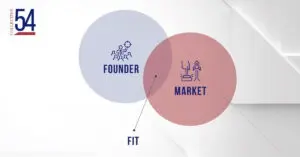Founder Market Fit: What Is It and Why Is It Mission Critical for Boutique Professional Service Firms?

Founder market fit is the relationship between the founder of a firm and the environment in which that firm operates. A good founder market fit means that the founder has a set of qualities, skills, and experiences that they are uniquely able to offer for the problems and opportunities of their chosen market.
The question it answers for clients is: Why you? Why should I choose you to deliver this service to me?
Why does founder market fit matter?
The quality of the founder market fit affects scaling a professional services firm. Professional services are considered “credence goods” — a credence good cannot be tested ahead of a sale, so prospects must take a leap of faith when purchasing them. These goods rely much more on clients trusting the service provider. Uniquely suiting your market matters because it helps you secure clients’ time and attention. Professional services firms rarely compete with other professional services firms. Their market competitiveness is for the client’s notice. So, founders who have a tight fit with the market can more easily convince clients to take that leap.
Founder market fit, then, encourages faster and easier scaling, especially for a boutique firm. Boutique service firms are small and their time is precious. They will face so many barriers to their firm’s growth, so they can’t afford to waste their limited resources on growth efforts that fall flat. They’re also people-based businesses. They can’t hide behind a beautiful object; the founder represents the business as a product would, and a founder with a clear market fit is a far more convincing representative.
How can you determine founder market fit?
There are nine main attributes of founder market fit. Screen your firm against these attributes to calculate if the founder and the market are a fit for your firm.
1. Client segment expertise. Does the founder know who comprises this market and do they understand how to form long-lasting relationships with these segments?
2. Proposed value. Is the founder offering something unique to the market, a service that will encourage it to turn to him or her for help?
3. Channel understanding. Does the founder have an affinity for the communication and distribution channels the market uses to educate themselves and buy services?
4. Sales. Is the founder acquiring clients in this market and do they know how to turn leads into clients?
5. Revenue streams. Does the founder understand the revenue model for this particular market? Can she develop revenue streams successfully, balance them with expenses, and earn a profit?
6. Relevant talent. Can the founder build and support a team whose skills are perfectly suited to serve this market?
7. Capital. Can the founder bootstrap herself to profitability to win in this market? If not, can she raise the needed capital to fund expansion?
8. Service delivery. Does the founder have confidence in the level of service they’re able to deliver to meet the needs of market members and earn repeat business?
9. Partnerships. Can the founder form the kind of key partnerships needed to win in this market? Referral generation and word of mouth is the key to market success.
One relevant example is Collective 54 member Ali Schwanke, founder of Simple Strat. Schwanke got her firm to dominate the YouTube search results for the term “Hubspot,” which is a very competitive term to go for. Now, firms who want to dominate search results on YouTube for their niche turn to her for help in this area. With these results, Schwanke showed that she understands how to build relevant talent, show her channel understanding, and provide her firm’s services with confidence (just to name a few).
Once founder market fit is accomplished, the daily challenges of business and the mission of small firm growth become easier.
If you haven’t reached your ideal founder market fit or are looking for scalable business strategies, check out my book “The Boutique” or listen to our podcast for real advice and stories from Collective 54 members.
